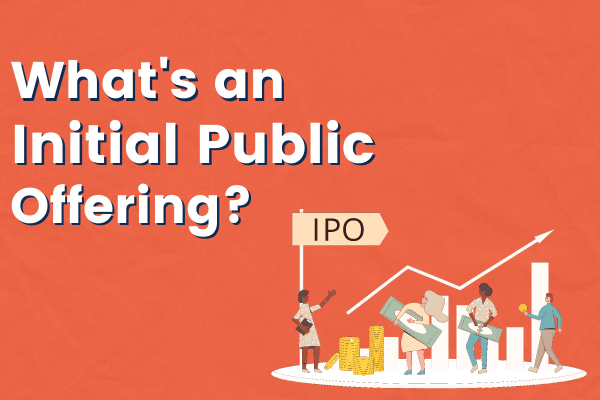An initial public offering, or IPO, refers to the first time shares of a company are sold to the public. Once the company’s shares are listed on a national stock exchange, retail investors can purchase and trade the stock.
IPOs can offer ample money-making opportunities, but they’re expensive to conduct, and public companies must continually comply with strict regulations from the SEC.
This article will break down what it means to “go public,” the journey from startup to IPO, and some of the pros and cons going public can offer your company.
How Does an IPO Work?
If a company has decided to go public, the business, whether it be new or old, has seen significant growth. When a company has reached a point where it can adhere to the difficulties of SEC regulations and is ready to benefit from public shareholders, it then expresses interest in going public.
In an initial public offering, an underwriting firm is selected to assist with the securities registration process and the distribution of the company’s shares to the public.
The underwriting firm can consist of an individual or multiple investment banks, such as Goldman Sachs or JP Morgan Chase.
When a firm takes on a company’s IPO, they put up money to fund the listing, essentially buying the company’s shares before they are listed on the stock market. If the shares increase in value, the firm can make a large profit.
The underwriting firm helps the company determine factors such as:
- Type of security that’s being sold
- SEC registration
- Initial offering price
- Number of shares to offer
- Ideal time to go public
Once this checklist is done, information about the company must be compiled for the S-1 registration statement. This two-part document consists of the prospectus and supplemental information; it must be listed on the SEC database EDGAR, which is available to the public.
The S-1 registration form requires companies to provide detailed information that will become available to the public, including:
- Business operations
- How proceeds will be used
- Financial condition of the company
- Price per share
- Information regarding company directors, executive officers, and key employees
- Detailed information regarding previous sales of unregistered securities and the exemptions which apply to those sales
Then, the company is one step closer to joining a U.S. stock exchange. While the company can see a rise in capital through going public, it is now responsible for keeping up with rigorous SEC regulations, but it also must try to stay in a positive light with public shareholders, which can be tricky.
Initial coin offerings, or ICOs, have become a popular alternative method of fundraising through cryptocurrency and blockchain technology. An ICO can be much cheaper to conduct than an IPO, and many companies mistakenly believe ICOs are subject to less regulation. However, SEC law still applies if securities are being sold to investors.
IPO Advantages and Disadvantages
While IPOs present companies with tons of advantages to help their business grow, they can also have their share of disadvantages.
Here are several pros and cons a company should be aware of before going public:
Advantages
Private companies can benefit from an IPO in several ways:
- Raise money for debt relief
- Fund growth initiatives
- Diversify their holdings
- Create liquidity by selling a portion of their private shares during the IPO
Disadvantages
- Ongoing expenses for marketing, accounting, and legal teams
- Disclosures could reveal business deals or secrets to competitors
- More time required to manage quarterly and annual reporting
Journey from Startup to IPO
The journey from a startup company to an IPO can be expensive and filled with regulatory hurdles.
Most startups are unlikely to begin with an unlimited amount of funds. In most cases, these companies don’t have much money at all; that’s why equity compensation is so popular among early-stage startups. Working toward an IPO typically takes several years, as well as outside investment.
Startup companies generally raise money through:
- Family, friends, and the founders of the company investing money and/or time in the business; this is also known as “bootstrapping”
- Seed funding from angel investors, individuals who invest in promising companies and typically receive a large share of the equity
- Series funding led by venture capital firms who often invest millions into companies with the potential to go public
Once a game-changing idea for a product has been developed, the startup aims to enhance it through constant research and feedback until it’s ready for market. During this period, the company is also focusing on marketing the product and increasing its customer base.
Successful startup companies can attract private investors, and down the road they can go public, presenting early investors with an “exit.” These investors’ shares are worth virtually nothing in the beginning, but by the time the company goes public, the value should have drastically increased, and founders can make enormous gains.
The startup companies that witness success when going public usually have several things in common: a founder who’s an expert in the respective field, a passionate team, and operating in the right-sized market.
Tesla’s Elon Musk was a great example of this with his relentless and unconventional approach to electrifying the automotive industry. Despite skepticism, Tesla’s first electric car, the “Roadster,” was one of the company’s major steps toward going public. Combined with Musk’s vision and unwillingness to accept failure, this led Tesla to become one of the most valued stocks in the U.S.
Unfortunately, not every startup company has a fairytale ending like Tesla’s. Reaching the IPO doesn’t happen overnight (for many startups, it never happens at all), but the companies with proper plans in place give themselves a better chance at rapid growth than those who don’t.
We can help your startup company determine the best business structure for the results you want. Give us a call to help launch your new venture!




